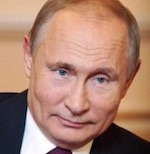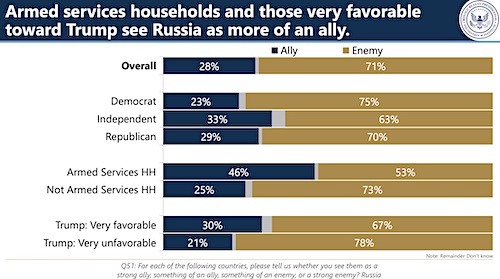Vladimir Putin's reliance on disinformation and propaganda to burnish the image of Russia in the west appears to have hit pay dirt, according to the results of the second annual Reagan National Defense Survey released in November.
 Vladimir Putin Vladimir Putin |
The poll found that 46 percent of armed services' households view Russia as an ally rather than an enemy of the US.
That figure compares with 28 percent of the overall population having a favorable image of Russia.
In the executive summary of the report, the Ronald Reagan Presidential Foundation noted that the upbeat view of Russia is predominantly driven by those "who responded to positive cues from president Trump about Russia."
The Pentagon is concerned about the rising pro-Russia sentiment in the military.
"There is an effort, on the part of Russia, to flood the media with disinformation to sow doubt and confusion," DOD spokesperson lieutenant colonel Carla Gleason told the Voice of America. "This is not only through discordant and inflammatory dialogue but through false narratives designed to elicit sympathetic views. We are actively working to expose and counter Russian disinformation whenever possible."
 |
Russia has been targeting the US military with a ramped-up influence campaign since 2017, according to the VOA. The goal: "seed US military personnel with the right type of disinformation so that they would be predisposed to view Russia and its actions in a more favorable way in the future."
Putin seems to have sown some successful seeds.
The Reagan survey also found that "launching cyberattacks on the US," cited by 24 percent of respondents, is the No. 1 concern about Russia. "Aiding Iran and other rogue regimes" (21 percent) and "interfering in our elections" (20 percent) ranked next.
How polarized is the US? President Trump took top honors in the tech PR firm Bospar's survey of the biggest PR winners and losers of 2019.
The poll found that 21.9 percent of respondents cited Trump as the biggest winner, while 32 percent believe he was PR's biggest fail.
"The president is a Rorschach test for the United States, especially when it comes to PR,” according to Curtis Sparrer, principal of Bospar. Trump's positive/negative PR numbers remind Sparrer of the wisdom of Star Wars Jedi Obi-Wan Kenobi, who observed, ‘"You’re going to find that many of the truths we cling to depend greatly on our own point of view."
Other losers: Hillary Clinton (9 percent), Nancy Pelosi (5.8 percent), Mark Zuckerberg (5.7 percent), while top winners were Michelle Obama (7.6 percent), Barack Obama (6.6 percent) and Taylor Swift (5.3 percent)
The strong US economy will drive US advertising outlays up 6.2 percent to $244B during 2019, according to WPP's GroupM ad-buying unit.
It projects 4.0 percent growth next year as spending for the Olympics and presidential election offsets a slowing of the economy.
The ad market also will get a major boost by the influx of streaming services, especially from newcomers such as Disney+ and Apple TV+.
GroupM expects new and existing streaming video services to "account for multiple billions of dollars in domestic advertising spending by the time these services are all operating at scale."


 The NBA, which promotes legalized gambling 24/7, seems more than hypocritical for banning player for placing bets... Diocese of Brooklyn promises to issue press release the next time one of its priests is charged with sexual abuse... Truth Social aspires to be one of Donald Trump's iconic American brands, just like Trump University or Trump Steaks or Trump Ice Cubes.
The NBA, which promotes legalized gambling 24/7, seems more than hypocritical for banning player for placing bets... Diocese of Brooklyn promises to issue press release the next time one of its priests is charged with sexual abuse... Truth Social aspires to be one of Donald Trump's iconic American brands, just like Trump University or Trump Steaks or Trump Ice Cubes. Publicis Groupe CEO Arthur Sadoun puts competition on notice... Macy's throws in the towel as it appoints two directors nominated by its unwanted suitor... The Profile in Wimpery Award goes to the Ford Presidential Foundation for stiffing American hero and former Wyoming Congresswoman Liz Cheney.
Publicis Groupe CEO Arthur Sadoun puts competition on notice... Macy's throws in the towel as it appoints two directors nominated by its unwanted suitor... The Profile in Wimpery Award goes to the Ford Presidential Foundation for stiffing American hero and former Wyoming Congresswoman Liz Cheney. JPMorgan Chase chief Jamie Dimon's "letter to shareholders" is a must-read for PR people and others interested in fixing America and living up to its potential... Get ready for the PPE shortage when the next pandemic hits... Nixing Netanyahu. Gaza carnage turns US opinion against Israel's prime minister.
JPMorgan Chase chief Jamie Dimon's "letter to shareholders" is a must-read for PR people and others interested in fixing America and living up to its potential... Get ready for the PPE shortage when the next pandemic hits... Nixing Netanyahu. Gaza carnage turns US opinion against Israel's prime minister. Trump Media & Technology Group sees Elon Musk's X as an option for those who want the free expression promised by Truth Social but without Donald Trump, owner of 57.3 percent of TMTG... Chalk one up for "anti-woke warrior" governor Greg Abbott as University of Texas lays off 60 DEI-related staffers... Five percent of Americans see the US as its own worst enemy, according to Gallup.
Trump Media & Technology Group sees Elon Musk's X as an option for those who want the free expression promised by Truth Social but without Donald Trump, owner of 57.3 percent of TMTG... Chalk one up for "anti-woke warrior" governor Greg Abbott as University of Texas lays off 60 DEI-related staffers... Five percent of Americans see the US as its own worst enemy, according to Gallup. Nine of the Top 100 firms that participated in O'Dwyer's rankings last year apparently threw in the towel for the 2024 scorecard. Seven other firms also went AWOL.
Nine of the Top 100 firms that participated in O'Dwyer's rankings last year apparently threw in the towel for the 2024 scorecard. Seven other firms also went AWOL.


 Have a comment? Send it to
Have a comment? Send it to 
No comments have been submitted for this story yet.